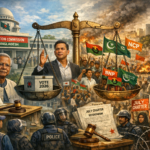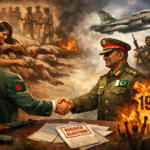
The story of Bangladesh’s independence in 1971 is one of resilience, sacrifice, and the extraordinary support of a neighboring nation: India. While the people of Bangladesh waged a heroic fight for liberation, it was India that played the pivotal role of a messiah, providing military, diplomatic, and humanitarian aid at a time when the world largely remained a bystander. Without India’s intervention, the victory over a genocidal regime might have been delayed, if not impossible. However, recent shifts in Bangladesh’s political rhetoric, coupled with the rise of hardline radical groups, raise pressing questions about whether the nation can sustain its independence while adopting an aggressive posture against India.
### **India’s Role in 1971: A Debt of Gratitude**
The Liberation War was not fought in isolation. When the Pakistan Army launched Operation Searchlight on March 25, 1971, indiscriminately targeting Bengali civilians, intellectuals, and students, India opened its borders to nearly 10 million refugees. The economic and social strain on India was immense, yet the country stood firm in its support for Bangladesh. Indian Prime Minister Indira Gandhi spearheaded global advocacy for Bangladesh’s cause, ultimately leading to a decisive military intervention in December 1971.
The joint Indo-Bangladeshi forces achieved a swift victory, culminating in the surrender of 93,000 Pakistani soldiers. This moment of triumph solidified Bangladesh’s independence and forged a bond of camaraderie and mutual respect between the two nations. India’s contributions, therefore, are not just historical footnotes—they are foundational to Bangladesh’s sovereignty.
### **The Rise of Hardline Radical Groups: A Threat to Stability**
Despite this shared history, the rise of hardline Islamist groups in Bangladesh threatens to erode the nation’s relationship with India and undermine the principles of secularism upon which it was founded. Radical organizations such as Hefazat-e-Islam and Jamaat-e-Islami have gained significant influence, promoting an exclusionary vision of Bangladesh that contradicts its pluralistic heritage. These groups often propagate anti-Indian rhetoric, framing India as an adversary rather than an ally.
This shift is not merely ideological—it has tangible consequences. Anti-Indian sentiments have led to a reimagining of the Liberation War narrative, downplaying India’s contributions and fostering mistrust. These narratives are exploited by opportunistic politicians, who use them to galvanize support among a disillusioned electorate, often at the expense of diplomatic ties with India.
### **Can Aggression Against India Be Sustained?**
Taking an aggressive stand against India is not only short-sighted but also potentially detrimental to Bangladesh’s long-term stability and independence. Economically, India remains one of Bangladesh’s largest trading partners, with bilateral trade reaching new heights in recent years. Strategically, India acts as a bulwark against external threats, offering a crucial partnership in areas such as counterterrorism, infrastructure development, and regional connectivity.
Alienating India risks isolating Bangladesh on the global stage, especially as radical groups gain prominence. The presence of such groups creates a volatile environment, making it harder for the country to maintain internal cohesion and address critical challenges like poverty, corruption, and climate change.
### **Preserving Independence Through Cooperation**
Bangladesh’s independence was won through the collective efforts of its people and the unwavering support of India. To sustain this independence, it is imperative for Bangladesh to reject the divisive narratives propagated by hardline radical groups and reaffirm its commitment to secularism and regional cooperation.
India, for its part, has shown remarkable restraint and continued to invest in Bangladesh’s growth, despite occasional provocations. The onus now lies on Bangladesh’s leadership to recognize the value of this partnership and address the root causes of radicalization. Education, counter-radicalization programs, and fostering cross-border cultural exchanges are essential steps toward building a future where Bangladesh and India can coexist as strong, interdependent neighbors.
### **Conclusion**
The lessons of 1971 remind us that independence is not merely the absence of external domination—it is the ability to chart a course of progress, unity, and cooperation. Bangladesh must reflect on its history and reject the false dichotomy of nationalism versus collaboration with India. Instead, it should strive to honor the sacrifices of its past by building a future that prioritizes peace, development, and mutual respect. In doing so, Bangladesh can truly safeguard its independence and uphold the legacy of those who fought for its freedom.





